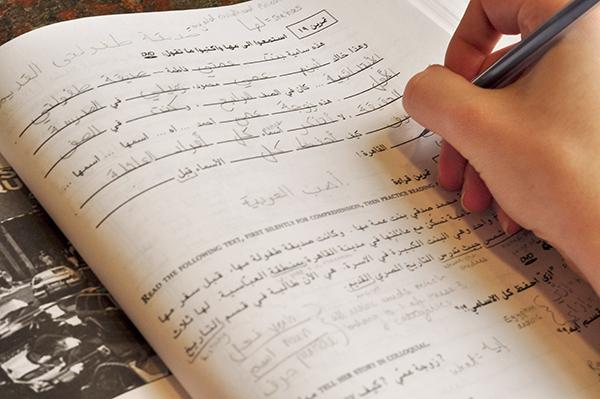
Of the 64 SUNY campuses, Binghamton University is the only one to offer a complete degree program in Arabic Studies. Over the past three years, more BU students have chosen to pursue a degree in Arabic Studies than ever before.
According to R. Kevin Lacey, an associate professor of classical and Near Eastern studies and director of the undergraduate Arabic and Near Eastern Studies program, there are about 50 students who major or minor in the subject, more than double the 2008 figure. Nineteen students graduated with degrees in the subject this past May, BU’s highest number in history.
Lacey said he believes the increase could be attributed to ongoing struggles in the Middle East and other nations where Arabic is prevalent.
“Sometimes it takes a crisis to alert the public to the importance of language studies,” he said. “Unfortunately or fortunately, the conflict in Egypt will contribute to the feelings of young college students to study Arabic.”
For Sharif Khalil, a senior double-majoring in Arabic Studies and accounting, the decision to study Arabic was more of a personal choice than one based in realpolitik.
“My dad is Egyptian and I never got to speak Arabic with him,” he said. “I didn’t know Binghamton had the major until I took my first class in it and realized I needed to go farther with it.”
But Khalil agreed that the sudden increase of students studying Arabic is attributable to a national push in the United States to better understand Arabic cultures.
“Our world is so much smaller now due to technology,” he said. “The government is trying to put together a force [of diplomats] who understands their culture and who have more knowledge of how they [Arabic cultures] live in the Middle East.”
According to Lacey, other factors that have increased interest in the program include pairings with history and politics majors, the high number of countries where Arabic is the official language, and a general curiosity sparked by world events. At BU, however, the retention rate of students who take introductory-level courses in Arabic studies choosing to major or minor in the subject is unusually high.
A Modern Language Association (MLA) survey found a 46 percent increase from 2006 to 2009 in students enrolled in Arabic courses. The same survey ranked Arabic the eighth-most studied language in the country, moving up to pass Russian and Latin since 2006.
Thus far, SUNY has been unable to keep up with the rising demand for Arabic courses. Lacey said that last fall, more than 80 students attempted to sign up for ARAB101 and while he was pleased that 70 were allowed into the two sections of the class, the high enrollment did not offer the conversational classroom environment he preferred.
“In a Spanish class, a professor can go around the room and ask ‘¿Como estás?’ to each student every day. Here, we don’t have that opportunity and the students can suffer,” Lacey said.
Despite the program’s limited resources, its students have taken advantage of options to study in the Middle East. In summer 2009, 28 BU students traveled to Egypt to study at Alexandria University. Lacey said the trip marked the largest number of students from the same American university to ever study in Egypt at the same time.
According to the website of the classical and Near Eastern studies department, which oversees the Arabic program, Arabic Studies students are encouraged to study abroad whenever possible, although Lacey said he is doubtful that 2011 will be a safe time for them because of current instability across much of the Arabic-speaking world.
Khalil said he has had the opportunity to make practical use of his knowledge of Arabic within the United States In 2009, he became the first BU student to hold a government internship in Washington, D.C. directly related to the program when he entered the National Security Internship. He said the purpose of the program was to develop a culturally aware government workforce through shadowing the Department of Justice for 20 hours a week and taking courses at George Washington University. In those courses, Khalil studied the Arabic language, Arabic film and culture and national security.
“The year after, they took a second person from the school,” Khalil said. “I think it shows that Binghamton is making a good name for itself.”
Khalil recognizes that the department is growing and gives credit for some of his success to professor Tayseer Gomaa’s teaching style. He said she makes a noticeable effort to offer a personal experience for each student.
“When someone is so passionate about something, it makes you want to be passionate, too,” Khalil said. “It’s enjoyable because the language has so much culture incorporated. The program deserves a lot of credit.”


